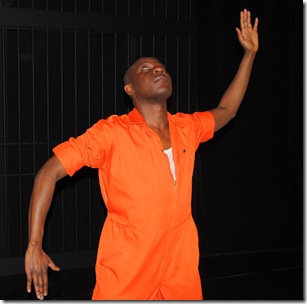Obaaberima`: Multiple identities merge into inspirational whole in Obaaberima
Photo: Barb Gray. Published in the Ottawa Citizen, Thursday, March 5, 2015
At one point early in Obaaberima, writer/performer Tawiah M’Carthy’s courageous one-man show about sexual identities, we watch the main character Agyeman, still a young boy, slip into a dress. The action, mimed by M’Carthy, is transformative, lighting a glow in Agyeman’s eyes and lending a sudden strength and ease to his posture: this male/female, we realize, is who he really is.
Problem is, Agyeman doesn’t see himself through our eyes. So it takes another couple of decades, years that are fraught with confusion, wrong turns, even a prison term, before he understands that wearing a metaphorical dress while remaining a male – in other words, exploring his male and female sides and ultimately coming out to himself and to the rest of the world — is his only real choice.
The triple Dora-winning play follows Agyeman from boyhood in homosexuality-denying Ghana to adulthood in more-open-but-yet-not-entirely-so Toronto. Such coming-out stories are no longer groundbreaking, but M’Carthy enacts this one (he has said it draws on but is not about his own life) with such intimacy and skill that it becomes one we’ve never before heard.
M’Carthy built Obaaberima from a poem and then a short workshop piece into the finished product, a kind of memory play blending storytelling, dance and music. It opens with Ageyman, in a bright orange prison jumpsuit arranged like an off-the-shoulder dress, in his stark prison cell the night before his sentence ends for an unnamed crime.
Behind and above him, partially concealed by the prison bars of Camellia Koo’s strikingly simple set, is multi-instrumentalist Kobena Aquaa-Harrison. His music and occasional vocals, are, like the story itself, variously warm, ominous, funny.
M’Carthy, who moves with the lithe instincts of the dancer that he was as a youngster, plays multiple characters: other children who taunt the young Agyeman by calling him “obaaberima,” a derogatory term meaning “girly boy”; Opayin, an older tailor/dressmaker in Agyeman’s village who introduces the boy to gay sex; Philippa, Agyeman’s deeply Christian girlfriend when he attends law school in Toronto; a dope-smoking ‘bro he meets at the university library.
Most important is Sibongile, Agyeman’s female half. She is the play’s narrator and is first revealed to Agyeman when Opayin, a part-time painter, renders her on canvass for his young companion (identity in this show may be rooted in sexuality but it includes artistic and other selves). Confident, sensuous, knowing, she’s the potential within the hesitant, questing Agyeman.
M’Carthy, supported by Michelle Ramsay’s un-fussily evocative lighting, plays these male and female characters with equal conviction and credibility, sometimes puncturing and heightening intense moments with laugh-out-loud humour.
Director and dramaturge evalyn parry has done a fine job of coaxing out the best in the play and in M’Carthy. One senses she urged him to be fearless in turning the mirror on himself but without forsaking the compassion and tenderness that help define the play.
In the end, the play is about multiple dualities including male/female, African/North American, imprisonment/freedom. M’Carthy’s achievement, like that of the orange jumpsuit-wearing person waiting for the prison door to swing open, is ultimately combining them into an inspirational whole.
Continues until March 14. Tickets: NAC box office, 1-888-991-2787, nac-cna.ca
Obaaberima
A Buddies in Bad Times Theatre production (Toronto)
At the National Arts Centre Studio
